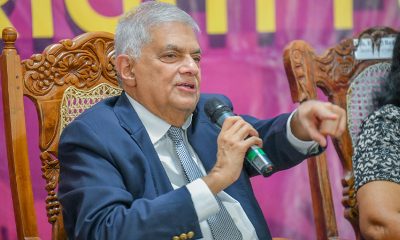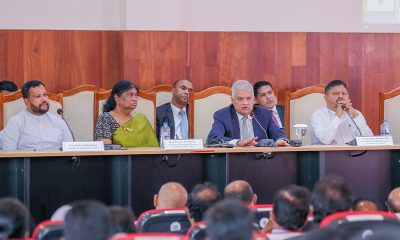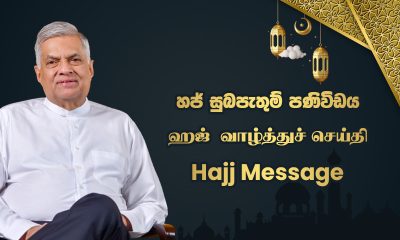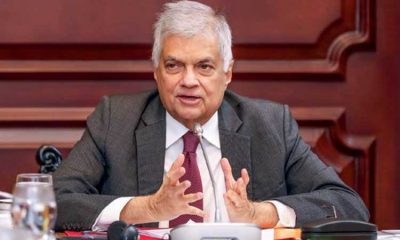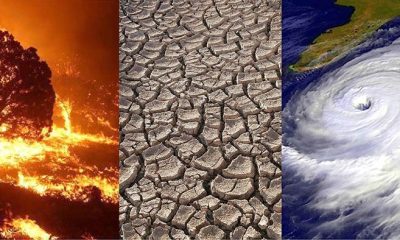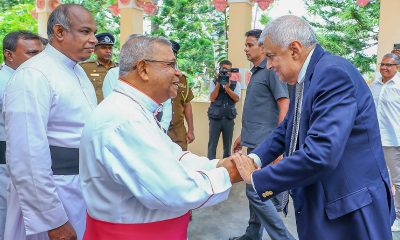Editorial
Trial balloon?

Nobody can be faulted for being deeply suspicious of the various ongoing moves of the government to make changes to the country’s electoral laws ahead of upcoming elections due within the next few months. President Ranil Wickremesinghe, as everybody knows, is serving out the former president’s term of office which ends in November next year when a successor must take office.
Thus the presidential election process must kick off some weeks earlier by August/September – that is less that one year down the road. The local government elections scheduled for last year, for which nominations were called for and received earlier this year, were not held on the grounds that there was no money to conduct an election. In this context it is obvious to one and all that the government funks elections, be they provincial, local or national, and will try every trick in the book to delay them for as long as possible. Hence the trial balloons.
Although some kind of normalcy has been achieved since the shambles of 2022 when Gotabaya Rajapaksa was ejected from the presidency and his brother, Mahinda, from the prime ministry, both the president and his government, despite many brave words, are very well aware that they are not top of the pops as far as the electorate is concerned.
This is also true of the president’s UNP and the Rajapaksa SLPP which elected and keeps him in office. It is not necessary to labour the fact that life is extremely difficult for ordinary people although the affluent continue to wine and dine at five star hotels and restaurants at prices that defy the imagination. Certainly, last week’s staff level agreement with the IMF and the current expectation that the delayed second tranche of the previously negotiated Extended Fund Facility will be available in the short term, together with the news that some debt sustainability arrangement with China is in the offing, leaves some room for optimism.
But the country is clearly not over the hill. IMF assistance comes at a price and coming weeks will see new shocks for sure. Electricity charges went up 18% from Friday. Recent rainfall flooding many parts of the country which brought some hydro-electricity generating reservoirs to near spill level should obviously have been taken this to account when deciding on a new tariff. There was no mention in the Public Utilities Commission’s (PUCSL) Friday news release on whether this was the case. The public has a right to this information and ideally the Minister and the CEB will have an early news conference on the subject in the interest of transparency.
The electricity price will obviously have a wide ranging knock-on effect. Apart from ordinary households, manufacturing industries will be confronted with higher production costs that will have to be passed down to consumers. Export industries like garments are already feeling the pinch of shrinking order books. There has to be an effect on most essential sectors. Fuel prices were raised recently but judging by Colombo traffic there does not appear to be a price-induced reduction of consumption. We are truly a ‘clean suit empty pocket’ race as the saying goes.
In this space last week we discussed possible candidates for the presidency and also made the point that more important than who will run is whether elections will be held on schedule. In any society undergoing the economic shock therapy that is our lot at present, it is vital that safety valves are opened on schedule so that public hope of a chance for change is not frustrated. The presidential election next year is the first scheduled election and it is in this context that the appointment of a nine-member commission headed by a former Chief Justice Priyasath Dep has created a degree of suspicion in the public mind that a process of not holding elections until its work is done has begun. The commission has been mandated to propose changes to the voting system and address many other election related matters. While many of these have been crying for attention for a long time, neither the president nor his government enjoy the public trust that they will not attempt to delay elections if that is to their advantage.
No time frame for the completion of the work of the commission has been set. Among the matters within the commission’s terms of reference is whether an individual be permitted to contest in both parliamentary and provincial council election. There has been no demand anywhere for such a provision as far as we know, and what the president’s reasons for examining such a possibility is not yet in the public domain. Last Sunday we ran a feature in this paper of Mr. RG Senanayake contesting both the Kelaniya and Dambadeniya seats at the 1956 general election and winning both seats. Senanayake was reputed to have raised both hands when a vote by a show of hands vote was called!
Whether anything is cooking following the Supreme Court determination that a minister who defected from the party from which he was elected had lost his seat. There are many defectors sitting in the incumbent parliament and reports suggest that some of them are getting jittery. But law professor GL Peiris, responding to a question at a press conference of the Dullas Alahapperuma faction of the SLPP, said that they had voted for the SLPP candidate against the UNP candidate Ranil Wickremesinghe. There has yet been no attempt by the SLPP to expel them from the party endangering their seats, he said, but if there was, they would strongly resist it.
Editorial
Transparency compromised

Monday 7th April, 2025
Indian Prime Minister Narendra Modi’s Sri Lanka visit saw the signing of seven MoUs between New Delhi and Colombo. Prominent among them are the MoU on the implementation of HVDC Interconnection for import/export of power, the MoU on cooperation among the governments of India, Sri Lanka, and the United Arab Emirates on developing Trincomalee as an energy hub, and the MoU on defence cooperation between India and Sri Lanka.
The signing of those MoUs, especially the one on defence cooperation, on 05 April, is a textbook example of irony. The significance of that day may not have been lost on keen political observers. The JVP, which leads the ruling NPP coalition, launched its first abortive insurrection on 05 April 1971, and one of the five classes it held to indoctrinate its new recruits, before sending them on a suicidal mission, was on Indian expansionism.
There is no gainsaying that Sri Lanka must not allow its land, sea and airspace to be used against India in any manner—or against any other nation for that matter. President J. R. Jayewardene, in his wisdom, got too close to the US in a bipolar world, and antagonised India in the process. He had the scourge of separatist terror and the Indo-Lanka Accord to contend with. The JVP went all out to scuttle the implementation of that accord, albeit in vain. The US and India have closed ranks today in a bid to thwart China’s rise, and a government led by the JVP has signed an MoU with India on defence cooperation!
The NPP government has violated one of the fundamental tenets of good governance––transparency. There has been no transparency about the aforesaid MoUs, especially the one on defence cooperation.
When the JVP/NPP was in the Opposition, it would flay governments for signing vital MoUs and pacts without transparency. It has kept Parliament in the dark about the MoUs in question. It is apparently emulating its bete noire, Ranil Wickremesinghe, not only in managing the economy but also signing vital MoUs!
India has demonstrated its ability to render Sri Lankan political parties malleable. PM Modi can justifiably pat himself on the back for having tamed the once anti-Indian JVP, which unleashed brutal violence purportedly to extricate Sri Lanka from what it described as India’s tentacles, in the late 1980s.
In 2024, the Modi government gave a diplomatic leg-up to the JVP/NPP, enabling its rise in national politics as a political party with some international recognition, and boosting its chances of winning elections. There is reason to believe that the JVP-led NPP would not have been able to win any parliamentary seats in the North and the East if it had not been in the good books of India. Interestingly, in October 2015, Dissanayake himself stated in Parliament that Jaffna had become a den of RAW spies. “They attempt to create political instability in Jaffna and we should put a stop to it,” he said. Today, the JVP is at India’s beck and call! In 2021, the then former MP Dr. Nalinda Jayatissa, who had been a member of the Parliamentary Select Committee that probed the Eastern Sunday terror attacks (2019), told BBC that he believed India had been behind the carnage, and his conclusion was based on ‘investigative evidence’. Dr. Jayatissa is the incumbent Media Minister. The JVP/NPP no longer inveighs against India for what it accused the latter of, in the past. Worryingly, its government stands accused of having blocked local media out of some key events related to PM Modi’s Sri Lanka visit over the weekend.
It is toe-curling to see some JVP leaders who resorted to mindless terror in a bid to scuttle the signing of the Indo-Lanka Accord , in 1987, going all out to justify the inking of an MoU on defence cooperation between their government and India, more than three and a half decades later. The signing of that particular MoU marked the JVP’s biggest-ever Machiavellian U-turn. If it had refrained from unleashing terror in 1987, tens of thousands of lives and state assets worth billions of US dollars could have been saved. Most of all, how would the JVP have reacted if a previous government had entered into MoUs with India?
Editorial
Bottom trawling: Right and Might

Indian Prime Minister Narndra Modi’s three-day visit here was predictably heralded by a blaze of publicity in the local press and electronic media. This was no cause for surprise given that good relations with our giant neighbour, or Big Brother as some would prefer to style it, must remain the cornerstone of Sri Lanka’s foreign policy. New Delhi accurately judged in which direction the political winds were blowing well ahead of last year’s presidential and parliamentary elections and invited the soon to be President Anura Kumara Dissanayake to visit India where he was well received. Weeks after being elected president, and scoring a better than two thirds majority in the parliamentary election that followed shortly thereafter, Dissanayake paid a state visit to India, his very first after being elected and was very warmly welcomed.
Prime Minister Modi is now here on a reciprocal visit and has a crowded agenda including a visit to Anuradhapura where he will pay homage to the sacred Jaya Sri Maha Bodhiya, grown from a sapling of the bo tree in India under which the Buddha attained enlightenment; and formally inaugurate the Maho-Anuradhapura railway signaling system and the newly upgraded Maho-Omanthai railway line, both assisted by India. Several memorandums of understanding, including possibly a Defence Co-operation Agreement, kept under wraps at the time of writing this comment, are due to be exchanged. Official word on the subject is that matters to be covered in the MOUs include energy, digitization, security and healthcare along with agreements relating to India’s debt restructuring assistance. But no details have been forthcoming.
Additionally, the visiting prime minister and his delegation who will have bilateral discussions with Sri Lanka’s president is also due to virtually inaugurate several India assisted projects. These include the Sampur solar power plant, the 5,000 mt temperature and humidity controlled cold storage facility in Dambulla and the installation of 5,000 solar panels across 5,000 religious sites here. Sri Lanka cannot forget the massive assistance provided by India in 2022 when this country faced the worst economic crisis in its contemporary history. At that time India provided multi-pronged assistance, including a $4 billion financing package through multiple credit lines and currency support, to help this country sustain essential imports and avoid defaulting on its debts.
Sri Lanka is undoubtedly benefiting from great power rivalry between India and China in the Indian Ocean where India seeks advantages through its Neighbourhood First policy while China seeks leverage through its Belt and Road initiative. The fact that the new Sri Lanka president chose to make his first state visit to India and thereafter follow with a visit to China may be an indication of priorities in Colombo. There is no escaping the reality that all countries must, where foreign relations are concerned, place their own national interest above all other considerations. This is so be it for Sri Lanka, India, China or any other country. Thus while not looking gift horses in the mouth, we must always be conscious that there is no such thing as a free lunch and be protective of our own interests.
Relations between Sri Lanka and India saw both high and low points during this century. The low was during the civil war Sri Lanka waged against the Liberation Tigers of Tamil Eelam (LTTE) in the earlier stages of which India allowed the insurgents to train and base on Indian territory. India, in fact, provided them with weapons and military training and other assistance through its RAW (Research and Analysis Wing). state intelligence agency. It may be argued that the communal disharmony between the Sinhalese and the Tamils that escalated into civil war was a problem of Sri Lanka’s own making and sub-regional sentiment in Tamil Nadu greatly influenced New Delhi’s hand in intervening.
Relations thereby plummeted and were restored to a point by the signing the Indo- Sri Lanka Peace Accord between President J.R. Jayewardene and Prime Minister Rajiv Gandhi in July 1987. With two insurrections raging in the north and south of the country, Jayewardene had no option but seek Indian assistance on India’s terms. What followed including Rajiv Gandhi’s assassination, as he campaigned for re-election as India’s prime minister is contemporary history that requires no elaboration. But since then, in the post 2022 situation when Sri Lanka faced an unprecedented economic crisis and was forced to declare bankruptcy, India came to our rescue with massive assistance and relations between the two countries have never been better.
At this point of time when Sri Lanka is headed in a new political direction under new leadership, will it be possible for the greatest irritant in present Indo-Lanka relations – bottom trawling by Indian fishermen poaching in Sri Lanka waters and destroying the marine environment – to be conclusively resolved? India has always adopted the position that this issue must be resolved in what she calls a “humanitarian manner.” It is undoubtedly a livelihood issue for fishermen – on both sides. Indian fishermen enjoyed free rein on the Sri Lanka side of the International Maritime Boundary during the war when Lankan fishermen were prohibited from going into deep sea. The Indians claim fishing in our waters to be their “traditional right.”
Prime Minister Modi’s party attempted to win votes in Tamil Nadu during the last election by accusing the Congress of “ceding” Kachchativu to Sri Lanka. The right on this issue is on our side while the might is on India’s. In the midst of honeyed words that will be much of the picture during until Sunday when the visit ends, result in might conceding to right? Even at least as far as stopping bottom trawling, illegal on our side though not in India’s goes?
Editorial
Dulling the pangs of hunger

Saturday 5th April, 2025
The government has, with the help of the National Food Promotion Board, the Ministry of Health and the Ministry of Agriculture, launched a programme to provide the public with nutritious food at reasonable prices as part of its Clean Sri Lanka initiative. The public, fleeced by private eatery owners ruthlessly, will surely benefit from this programme, which deserves praise. It will also help improve the government’s approval rating significantly. A way to a person’s heart is said to be through his or her stomach.
A widely-held misconception is that every prospect pleases in this country, and only politicians are vile. True, most politicians are thought to be bad, but it is not fair to single them out for castigation. There are many others who are either equally bad or even worse. The blame for people’s hardships due to the high cost of living should be apportioned to the business community, given to unconscionably exploitative practices; its members, from wayside eatery owners to corporate fat cats, jack up the prices of their products and services according to their whims and fancies, at the expense of the public. The rice millers have become a law unto themselves.
Why food inflation is high is not difficult to understand. A plain hopper is priced at Rs. 25, and an egg costs about Rs. 30 at present, but an egg hopper is sold at Rs. 100! Food prices that went into the stratosphere at the height of the economic crisis in 2022 have not come down significantly owing to the greed of the unscrupulous members of the business community.
The government initiative to make quality food available at reasonable prices to the public should continue, and it is hoped that the NPP leaders will also develop the Hela Bojun Hala (HBH) restaurant chain under the Ministry of Agriculture. These eating places not only sell nutritious food made from local ingredients at very reasonable prices but also economically empower women. All HBH outlets are run by women and do not sell wheat flour products or sugary drinks.
The NPP government can give a turbo boost to the HBH programme by expanding it across the country. That will help provide direct employment to many more women. Sri Lanka’s overall unemployment rate is 4.7%, and about 6.7% women are unemployed. Besides, during gluts, fruit and vegetable growers often dump their unsold produce on the roadside in protest. The government may be able to use the HBH network to help the farming community while generating employment opportunities and providing the public with quality food at affordable prices.
Minister of Agriculture K. D. Lalkantha, known for innovative thinking and hard work, was the chief guest at the recent launch of the aforesaid food programme. He should take time off from pursuits such as counting monkeys and give serious thought to developing the HBH network further so that more people will have access to reasonably-priced, hygienic, and nutritious foods, and more jobs can be created for women, and men as well if a home delivery service is set up at the HBH outlets.
Sri Lanka’s political culture is such that when a new government is elected it launches its own programmes and either scrap the ones introduced by its predecessor or let them wither on the vine. It is hoped that the NPP government will be different and develop the HBH programme, which has become a success.
-

 Business14 hours ago
Business14 hours agoColombo Coffee wins coveted management awards
-

 Features2 days ago
Features2 days agoStarlink in the Global South
-

 Business3 days ago
Business3 days agoDaraz Sri Lanka ushers in the New Year with 4.4 Avurudu Wasi Pro Max – Sri Lanka’s biggest online Avurudu sale
-

 Business4 days ago
Business4 days agoStrengthening SDG integration into provincial planning and development process
-

 Business3 days ago
Business3 days agoNew SL Sovereign Bonds win foreign investor confidence
-

 Sports5 days ago
Sports5 days agoTo play or not to play is Richmond’s decision
-

 Features2 days ago
Features2 days agoModi’s Sri Lanka Sojourn
-

 Sports4 days ago
Sports4 days agoNew Zealand under 85kg rugby team set for historic tour of Sri Lanka


